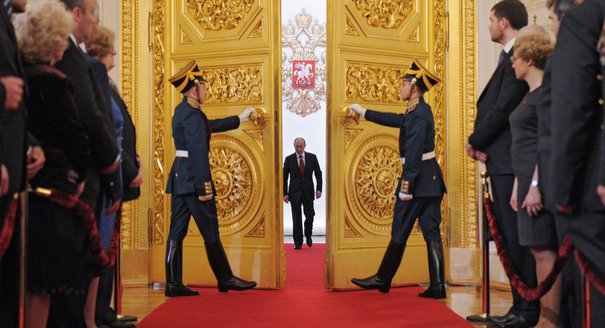Every week leading experts answer a new question from Judy Dempsey on the international challenges shaping Europe’s role in the world.
Fraser Camerondirector of the EU-Russia Centre
The West should take Russia’s concerns seriously. Moscow’s position is less about the outcome than the principle of intervention. Who decides is key for Moscow. Rightly or wrongly, Russia feels duped over the Western intervention in Libya and Putin is determined to not let it happen again, especially when there are so many uncertainties. This may or may not be the endgame for Assad’s Syria. He still has the upper hand in terms of military force which he is clearly ready to use. And just who are the rebels? What impact would a possible Islamic government in Syria have on the North Caucasus? These are legitimate questions that Russia is raising.
This is not to defend Russia. Moscow could probably put more pressure on Syria to stop the violence. But finger-pointing at Moscow will not bring about a change in policy. After all, as Putin points out, the United States has exercised a veto over 60 times on Middle East resolutions at the United Nations. And this week the European Union seems happy to upgrade its relations with Israel despite its condemnation of illegal settlements on the West Bank. What message is sent by Washington and Brussels to the people on the ground?
James W. Davisdirector of the Institute of Political Science, University of St. Gallen
How soon we forget! Anyone who thinks Russia’s current paranoia is particular to Vladimir Putin would do well to read George Kennan’s “Long Telegram” of February 26, 1946. Then stationed in the U.S. embassy in Joseph Stalin’s Soviet Union, Kennan argued that the source of the “Kremlin’s neurotic view of world affairs is traditional and instinctive Russian sense insecurity. Originally, this was insecurity of a peaceful agricultural people trying to live on vast exposed plain in neighborhood of fierce nomadic peoples. To this was added, as Russia came into contact with economically advanced West, fear of more competent, more powerful, more highly organized societies in that area. But this latter type of insecurity was one which afflicted rather Russian rulers than Russian people; for Russian rulers have invariably sensed that their rule was relatively archaic in form fragile and artificial in its psychological foundation, unable to stand comparison or contact with political systems of Western countries. For this reason they have always feared foreign penetration, feared direct contact between Western world and their own, feared what would happen if Russians learned truth about world without or if foreigners learned truth about world within.” Because the causes of Russia’s bunker mentality are deeply cultural and anchored in a long history, there is quite little the West can do to change it.
Gianni Riottamember of the Council on Foreign Relations
This is a tough one. For my summer reading list, I've suggested three great Russian books by Vitaly Ginzburg, Venedikt Erofeev, and Vasily Aksenov. Russian bunker mentality is just one face of the coin. The other is the Russian passion for world's ideas. In his masterpiece novel Oblomov, Ivan Goncharov opposes the European flair of Stolz to the stagnant Russian personality of Oblomov. Indeed he means that the two attitudes are specular of the Russian soul, displaying openness and fear. Even the Russian revolution, cosmopolitan, and global, yet domestic and paranoid, testify to this truth. Europe has to engage Russia, but Russia should eventually give in to reality and engage with Europe, because there is no Europe without Russia and vice versa. When the two cultures meet there is hope, when they collide there is always trouble.
Eugeniusz Smolarsenior fellow at the Polish Institute of International Affairs in Warsaw
Politically nothing. Full stop.
Russian's “bunker mentality” is a matter of Russian-Soviet geopolitical tradition and of choice. It relates to one of few tools of regime mobilization. It can hardly function without enemies. This is the reason behind the new law on labeling non-governmental organizations as “foreign agents” if financed from abroad.
“Wsie wsio znajut”—in Russia the elites “know everything” about the West and its peaceful intentions, but that will not change attitudes and transactional policies of the Kremlin. Millions of Russians now travel and settle in the West. They know the realities.
We should invest in the young generation, offer study grants, work exchanges, support EU- Russia civil society forum, deepen practical cooperation between local governments etc., and... wait.
If Putin wants a transactional type of relationship, we should not have problems with that. We should also stop bubbling about a community of values where there are none.
Stephen Szaboexecutive director, Transatlantic Academy
It may be more accurate to speak of Putin’s bunker mentality rather than a Russian syndrome. Most Russians remain open to the West, especially to the European Union, and to a lesser extent, the United States. Putin has played on feelings of humiliation and pride to run a short-term and short-sighted campaign against the West, but both his regime and the Russian economy are critically dependent on the Western economy and need the West for any hope of modernization. In short, the West is the best long-term strategic partner for a Russia which is a brick in terms of its potential to fall rather than a BRIC. It holds the trump cards, not Moscow. Given that the long-term prospects for accommodation with Russia are reasonably good, there is no reason for Western leaders to go out of their way to accommodate or reward short-sighted and obstructionist Russian leadership which, in many ways, has become a mafia state. Europe and the United States should pursue a common approach which makes it clear that it will not compromise its standards, for example in the Sergei Magnitsky case or in the case of Syria, but rather let the weakness of Putin’s strategy play out.






.jpg)